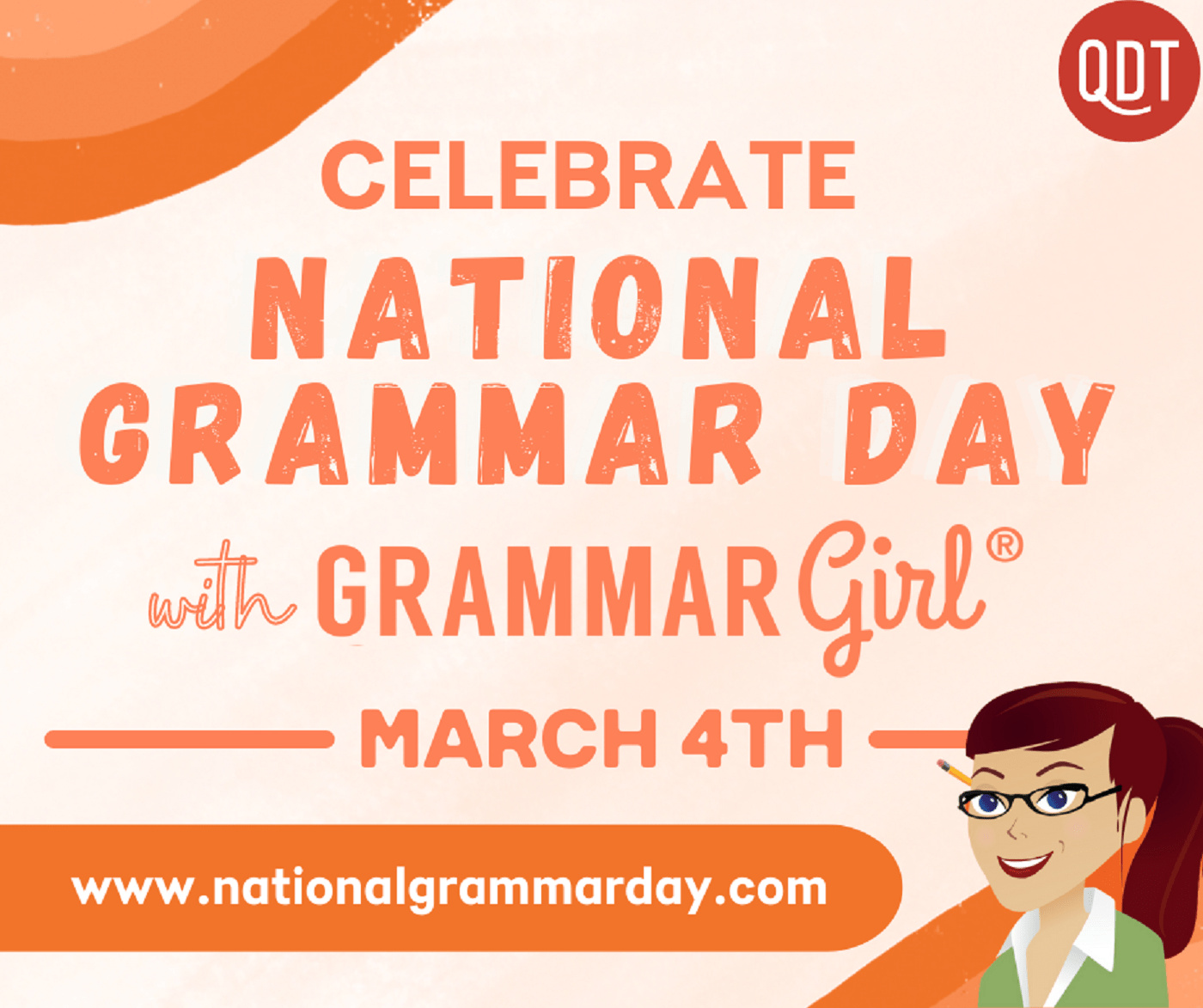The official home of National Grammar Day!

National Grammar Day is March 4th! On National Grammar Day, we celebrate good grammar in both our written and spoken communication.
Keep reading for great grammar resources to help you become a better writer and communicator!

Established in 2008 by Martha Brockenbrough, author of Things That Make Us [Sic] and founder of the Society for the Promotion of Good Grammar, National Grammar Day was officially recognized by President George W. Bush.
In the years following, National Grammar Day has been hosted by Mignon Fogarty, the creator of the Grammar Girl podcast and author of the New York Times bestselling book Grammar Girl’s Quick and Dirty Tips for Better Writing. Mignon is also the founder of the Quick and Dirty Tips podcast network, the best place to find fast, digestible help on everything from fitness to mental health.

Poetry Contest
Results are coming soon for the 2024 ACES National Grammar Day poetry contest.
The winner will receive a one-year membership to ACES: The Society for Editing and a signed copy of “The Grammar Daily: 365 Tips for Successful Writing from Grammar Girl.” The winning poem will be featured on the Grammar Girl podcast.
Free for National Grammar Day: Grammar Girl's Writing Course
To help you make the most of National Grammar Day, Mignon has made one of her popular LinkedIn Learning courses free!
Head to LinkedIn and get 24 hours of free access and learn how to write in active voice, how to write better lists, how to break up run-on sentences, and more.
Ten Grammar Myths Exposed!
Having good grammar means being able to separate fact from fiction. Here are ten popular grammar myths—how many do you believe?
- A run-on sentence is a really long sentence.
- You shouldn’t start a sentence with the word “however.”
- “Irregardless” is not a word.
- There is only one way to write the possessive form of a word that ends in “s.”
- Passive voice is always wrong.
- “I.e.” and “e.g.” mean the same thing.
- You use “a” before words that start with consonants and “an” before words that start with vowels.
- It’s incorrect to answer the question “How are you?” with the statement “I’m good.”
- You shouldn’t split infinitives.
- You shouldn’t end a sentence with a preposition.
Before you write in to express your outrage, read our full debunking of each myth.
Grammar Girl’s National Grammar Day Playlist
“Myriad” or “Myriad of”? “Irregardless” or “regardless”? “Desert” or “dessert”?
Every week, the award-winning Grammar Girl podcast provides short, friendly tips to improve your writing and feed your love of the English language. Whether English is your first language or your second language, these grammar, punctuation, style, and business tips will make you a better and more successful writer.
We hand-picked a few of our favorite episodes below to get you started! But you can listen and subscribe on Apple Podcasts, Spotify, YouTube, or wherever you get your podcasts.
More Grammar Resources for Every Day of the Year
- Grammar Girl’s Editing Checklist
- Quick and Dirty Tips for Better Writing on LinkedIn Learning
- Grammar Girl books
- Media contact—send your request for interviews to media@quickanddirtytips.com
More Fun Ways to Celebrate National Grammar Day
March Forth: the Grammar Song – featuring Grammar Girl and friends!
The Grammartini – take your celebration to the next level (after hours, of course) with this fun recipe from founder Martha Brockenbrough. (In 2021, Martha suggested we switch the official drink to the gramargarita. Recipes welcome!)
Grammar Noir (short stories by John E. McIntyre)
- The Practice of Lexis Can Lead to Tsuris (2024)
- The Old Editor Grilled (2023)
- Corpora Punlishment (2022)
- To Infinitive and Beyond: A Grammar Day Dialogue (2021)
- A Grammarian Walks into a Bar (2020)
- A Purist Walks into a Bar (2019)
- Clause and Effect (2018)
- A Stet in the Dark (2017, sadly, no longer available online)
Free Materials for Classroom Fun and Learning
Language-Themed Cartoons
Apostrophes Under the Sea music video by Healthwise

